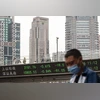China's central bank kept a key lending rate unchanged on Monday, choosing not to loosen credit as data for May showed signs of persisting weakness in the world's No. 2 economy's manufacturing and real estate sectors.
The central bank kept its rate for 1-year medium-term lending facility loans, used as a benchmark for other lending rates, at 2.5 per cent. The decision aligned with expectations: instead of cutting already low interest rates Beijing has focused on channeling spending to areas considered to be high priorities such as high-tech industries.
The government reported Monday that factory output fell 5.6 per cent in May from the year before, slowing from 6.7 per cent in April, though analysts noted some impact due to more work days in this year compared with the year before.
Property investments fell 10 per cent year-on-year and home sales sank 30.5 per cent, suggesting a raft of measures to try to turn around a real estate slump have yet to take hold.
Home prices in major, so-called Tier 1 cities like Beijing and Shanghai, fell 3.2 per cent.
The downturn in the property industry followed a crackdown on excessive borrowing by property developers several years ago. That led many to default on their debts as they meanwhile have struggled to deliver apartments that buyers had already paid for. That also hit contractors and suppliers of building materials, appliances and other household goods.
This data was certainly on the disappointing side and may ring some alarm bells, as May's policy support package has not yet translated to a slower decline of housing prices, let alone a stabilization, Lynn Song, chief economist for Greater China at ING Economics, said in a commentary.
Five of China's major state-owned banks said on Thursday they would cut deposit rates, days after the country surprised markets by lowering benchmark lending rates to bolster growth in a struggling economy.
More From This Section
Disruptions and job losses during the COVID-19 pandemic, coupled with falling prices for homes a staple form of investment for most Chinese families have left many Chinese unwilling or unable to spend, sapping the economy of another major driver of business activity.
Although the external environment is complex and changeable and the domestic economy is also facing some troubles and challenges, the fundamentals of economic recovery and long-term improvement have not changed, Liu Aihua, spokesperson for the National Bureau of Statistics, told reporters in Beijing.
She pointed to rising retail sales and investments in various high-tech industries as signs of progress. A program encouraging Chinese families to recycle old appliances and trade in their cars for new, electric vehicles is helping revive consumer spending, Liu said.
Sales of products online, which account for about a quarter of all retail sales, rose 11.5 per cent in May, while sales of household appliances and audio-visual goods such as televisions rose nearly 13 per cent in May.
Chinese buyers also have returned to auto showrooms, with vehicle sales climbing 8.3 per cent from a year earlier to nearly 11.5 million units in January-May, the China Association of Automobile Manufacturers reported last week. Auto sales rose 1.5 per cent in May.
Buying capacity and consumer confidence needs further improvement, but there are many favourable factors supporting continued growth of the consumer market, Liu said.
Liu said there would be more policies to support the ailing real estate market, following moves to reduce mortgage rates and down-payment requirements for some property purchases, among other recent moves meant to help ensure that home buyers are able to get the properties they have purchased.
We must also see that the implementation time of some policies is still relatively short, Liu said.
)